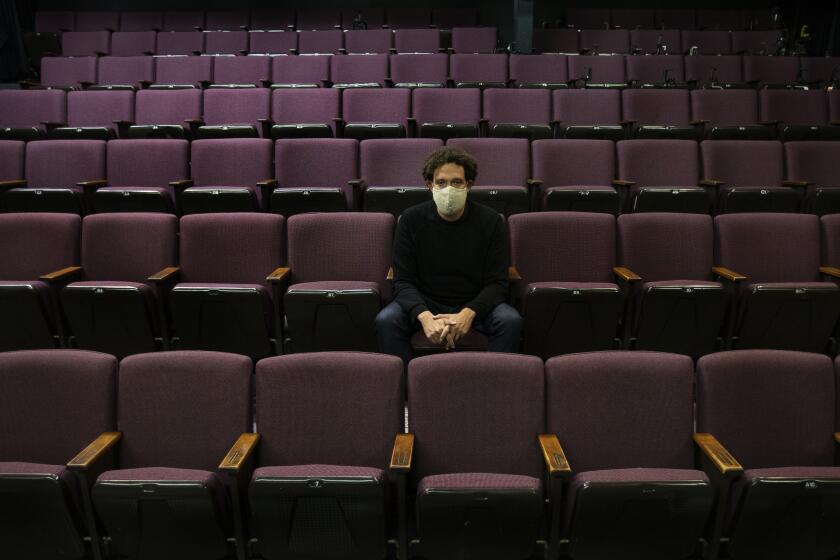Center Theatre Group to remain dark until spring 2021; staff furloughs stretched
- Share via
Center Theatre Group announced on Tuesday that it would remain dark until spring 2021 to help curb the spread of COVID-19 — an unprecedented, more than 56-week closure period. The largest nonprofit theater company in Los Angeles — which stages productions at the Ahmanson Theatre, Mark Taper Forum and Kirk Douglas Theatre — said programming is scheduled to resume in late April.
“I am confident that we can return safely to the stage with this new schedule,” Artistic Director Michael Ritchie said in a statement. “Should health officials become more optimistic about a safe timeline to resume large gatherings, we will work as quickly and safely as possible to return to the stage sooner.”
The Ahmanson’s 54th season is scheduled to kick off with “To Kill a Mockingbird,” April 29 through June 6. Return engagements of the musicals “Come From Away” (June 9-20) and “Ain’t Too Proud: The Life and Times of The Temptations” (Aug. 11-22, 2021) will follow. Both productions have been halved to two weeks to accommodate other markets. “The Prom” will run for a month between them (July 6-Aug. 8, 2021).
“We absolutely believe that they could have played very strongly in their original, longer runs — they’ll be tough tickets to get when we have them,” Ritchie told The Times. “But we will also have the opportunity to bring them back again in following seasons, as warranted.”
Struggling arts venues asked audiences to donate tickets to canceled shows rather than request refunds. But did people do that? Our survey results.
The scheduling scramble means previously announced productions of “The Lehman Trilogy,” “Dear Evan Hansen,” “Les Misérables” and “Hadestown” will be pushed to later in the season. Dates — along with an additional production, not yet announced — are forthcoming.
“This whole rearrangement is actually happening across the country because it’s a domino effect: When we say when we’re doing a show, it affects all the people in the show and commitments they have elsewhere,” Ritchie said.
The Taper and Douglas seasons, yet to be announced, are expected to resume in spring 2021 as well. CTG remains committed to its only previously announced Taper title: “Slave Play.” The production was set to be the first post-Broadway staging of Jeremy O. Harris’ landmark work.
“We think that L.A. audiences need to see this important work,” CTG Managing Director Meghan Pressman said. “It’s an incredibly difficult work to interact with, and we hope to bring it to our audiences in a thoughtful way.”
CTG’s stages went dark on March 12, along with nearly all of the city’s performing arts venues. Its remaining performances of “The Book of Mormon” were canceled, and the entire runs of “The Antipodes” and Block Party’s “The Art Couple” and “Canyon” were scrapped.
Its 2019-20 season closers — Aasif Mandvi’s one-man show, “Sakina’s Restaurant,” Diane Paulus’ revival of the musical “1776” and Rajiv Joseph’s play about LeBron James, “King James” — were postponed indefinitely. Numerous national tours — including the Tony-winning “Once On This Island,” which was scheduled to play at the Ahmanson — were forced to end early.
An open letter protests systemic racism in the American theater. How can we can get back on track? Start by reading the plays providing a roadmap.
CTG said the lengthy closure is expected to result in losses of approximately $40 million in ticket revenue across the three venues. That’s led to drawn-out employee furloughs — originally set to end in August, the furloughs have been extended until early next year, leaving CTG with 50% to 60% of pre-pandemic staffing — and a 65% cut in operating budget over the upcoming fiscal year.
An emergency fund has been launched, with members of the organization’s board of directors agreeing to match all donations up to $500,000 through June 30.
CTG will continue its virtual initiatives — including digital courses for emerging theater professionals and conversations about the future of the art form — until its doors reopen.
“We are grateful to have the support of our community, but what we keep focusing on is what our community needs of us over the next nine months or more without theater on our stages,” Pressman said.
“We strive for CTG to be instrumental in redefining what theater looks like for Los Angeles but also what it looks like to be responsive to our communities and to be of service,” she added. “To the extent that we can do that while our stages are dark, that’s what we’re really trying to do.”
More to Read
The biggest entertainment stories
Get our big stories about Hollywood, film, television, music, arts, culture and more right in your inbox as soon as they publish.
You may occasionally receive promotional content from the Los Angeles Times.












